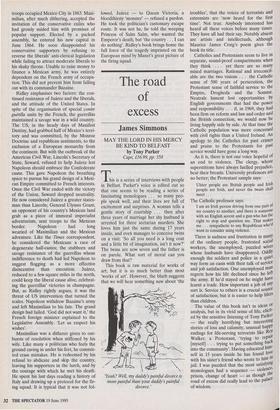The road of excess
James Simmons
MAY THE LORD IN HIS MERCY BE KIND TO BELFAST by Tony Parker Cape, £16.99, pp. 358 This is a series of interviews with people in Belfast. Parker's voice is edited out so that one seems to be reading a series of fascinating monologues . . . so many peo- ple speak well, and their lives are full of excitement and surprises. A woman tells a gentle story of courtship . . . then after three years of marriage her shy husband is arrested for three sectarian murders. She loves him just the same during 17 years inside, and even manages to conceive twins on a visit: 'So all you need is a long coat and a little bit of imagination, isn't it now?' The twins are now seven and the father is on parole. What sort of moral can you draw from that?
This book is raw material for works of art; but it is so much better than most `works of art'. However, the blurb suggests that we will hear something new about 'the `Yeah? Well, my daddy's painful divorce is more painful than your daddy's painful divorce.' troubles', that the voices of terrorists and extremists are 'now heard for the first time'. Not true. Anybody interested has heard all these voices before many times. They have all had their say. Notably absent are artists and intellectuals, although Maurice James Craig's poem gives the book its title.
Catholics and Protestants seem to live in separate, sound-proof compartments when they think . . yet there are so many mixed marriages. Rational and irreconcil- able are the two visions . . . the Catholic sense of 500 years of persecution, the Protestant sense of faithful service to the Empire, Drogheda and the Somme. Neutrals lament lost opportunities by English governments that had the power and responsibility . . . if, in 1969, they had been firm on reform and law and order and the British connection, we would now be living happily side by side. At that time the Catholic population was more concerned with civil rights than a United Ireland. An apology to the Catholics for past crimes and praise to the Protestants for past service would have gone a long way. As it is, there is not one voice hopeful of an end to violence. The clergy, whose superstitions have always fuelled prejudice, beat their breasts. University professors are no better; the Protestant sample says:
Ulster people are British people and Irish people are Irish, and never the twain shall meet .
The Catholic professor says: 1 am an Irish person driving from one part of my country to another, and there is someone with an English accent and a gun who has the right to stop and question me. That makes me . . . sympathetic to any Republican who'd want to consider using violence.
There is sadness and frustration in many of the ordinary people, frustrated social workers, the unemployed, puzzled wives whose husbands have disappeared. Oddly enough the soldiers and police in a quiet way form an oasis with their talk of service and job satisfaction. One unemployed matt regrets how his life declined since he left the army. If he'd stayed on he might have learnt a trade. How important a job of any sort is. Service to others is a crucial source of satisfaction; but it is easier to help lifers than children.
The value of this book isn't in ideas or analysis, but in its vivid sense of life, elicit- ed by the sensitive listening of Tony Parker — the really horrifying but interesting stories of loss and calamity, unusual hapPY endings for life-serving terrorists like Roy Walker, a Protestant, 'trying to rePatr [myself] . . . trying to put something back into the community'. Having educated hug' self in 15 years inside he has found i love with his sister's friend who wrote to him n jail. I was puzzled that the most satisfying monologues had a sequence — violence, prison, change of heart — as though the road of excess did really lead to the palace of wisdom.


















































 Previous page
Previous page